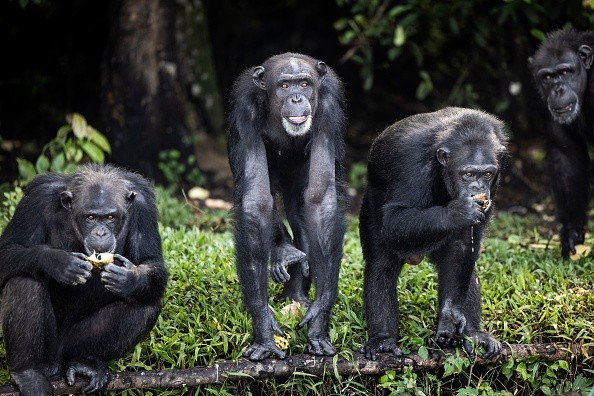Researchers studying the behavior of chimpanzees recently came up with some fascinating findings. There is a fundamental assumption in human culture and society that learning new things and passing that knowledge on to the next generation is essential.
However, recent findings showed that this method, known as "cumulative culture," may not be unique to humans. A new study claims that chimpanzees do the same.

Cumulative Culture in Chimpanzees
When chimpanzees see nuts or stones, they are unsure on what to do. It may seem like a minor detail, but it tells researchers a lot about how they learn and pass on information.
The use of tools to break nuts has been discovered by certain chimpanzee groups in Guinea; however, this has not been discovered by all.
Chimps can learn how to crack nuts on their own, but scientists wanted to find out if that ability is handed down within a group. Chimpanzee culture, like human culture, may be based on the practice of transmitting information from one person to the next, according to ZME Science.
Primatologist Kathelijne Koops and her team from Zurich University conducted an experiment where they exposed a group of chimpanzees about six kilometers away from a group that uses tools to crack open nuts.
Experimental Findings
The chimps were first enthralled by the stone implements. It took them several months, but they never figured out how to crack the nuts.
To help the chimps get used to the new meal, the researchers also included a palm fruit in the experiment. Some nuts were cracked open and set on top of the stone tools as a suggestion, and they also offered nuts that were easier to crack.
They tried everything, but the chimps would not crack open the nuts unless they were shown how to do so.
This shows that chimpanzees teach each other how to break nuts, much like humans do. As a result of this process of social learning, human culture has been able to create increasingly sophisticated tools and technologies over time, as per SciTech Daily.
Due to this new discovery, researchers may have to rethink how unique human civilization is.

Cultural Evolution in Human and Chimpanzee
Because humans and chimpanzees are so closely related, their DNA is very similar. Humans, chimpanzees, and bonobos all share a common ancestor that lived six to seven million years ago.
In the course of human and chimpanzee evolution, their DNA, which is passed down from generation to generation, evolved as well. Several of these mutations in the human genome led to differences in appearance and behavior between humans and chimpanzees.
Researchers thought that imprisoned primates may have picked up tool-using behavior from humans they watched using them in previous tests, which demonstrated that primates may learn to use tools without instruction. Recent evidence suggests the theory is correct, according to this new study.
Since chimps and humans are so closely linked biologically, it's conceivable that cumulative culture was owned by their common ancestor with chimpanzees. Chimpanzee and human cultural evolution is more closely linked than previously thought, according to the experts.
Related Article : Russian Scientist Attempted to Create Human-Chimp Hybrid, But the Results Were an 'Abomination'
For more news, updates about chimpanzees and similar topics don't forget to follow Nature World News!
© 2026 NatureWorldNews.com All rights reserved. Do not reproduce without permission.





